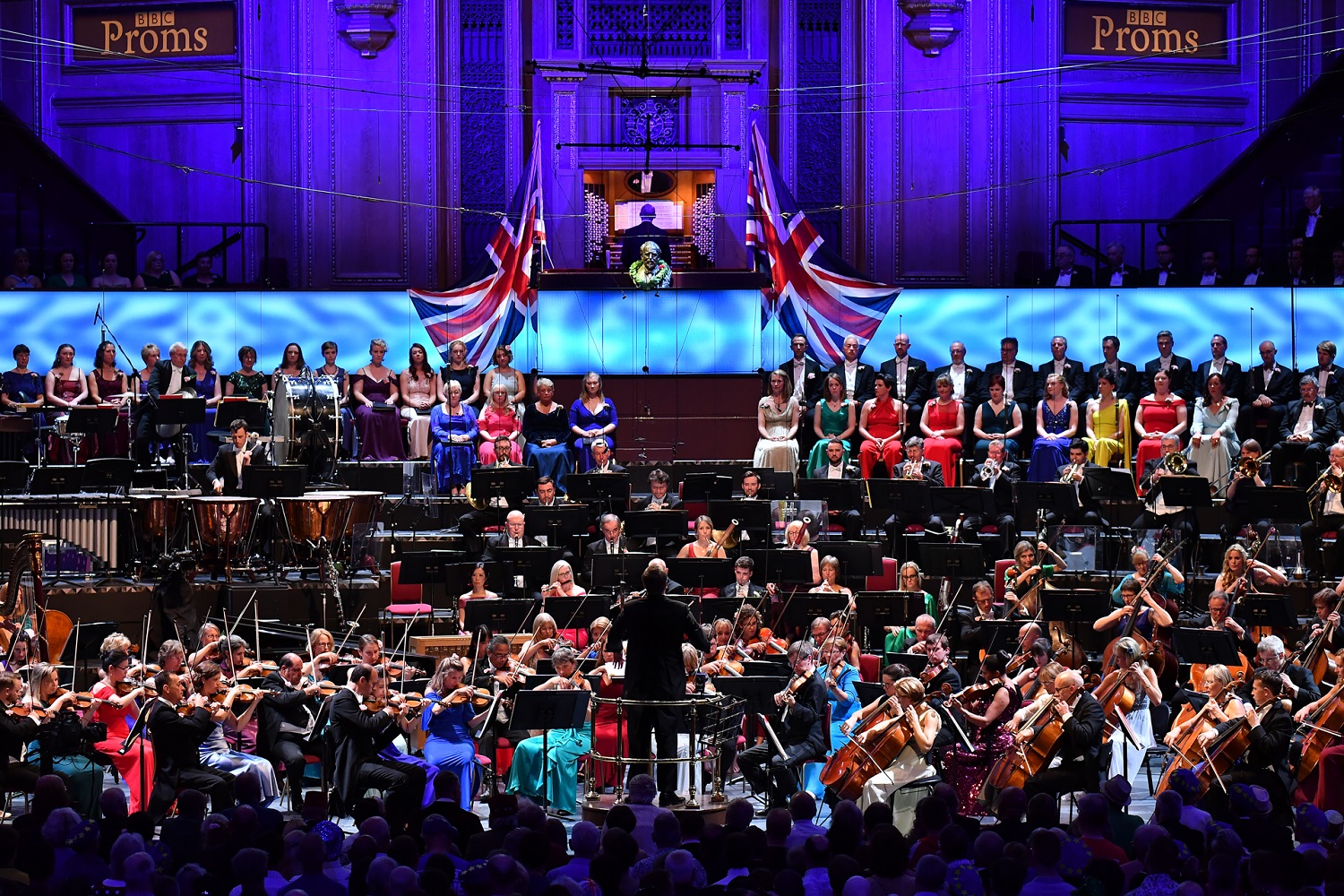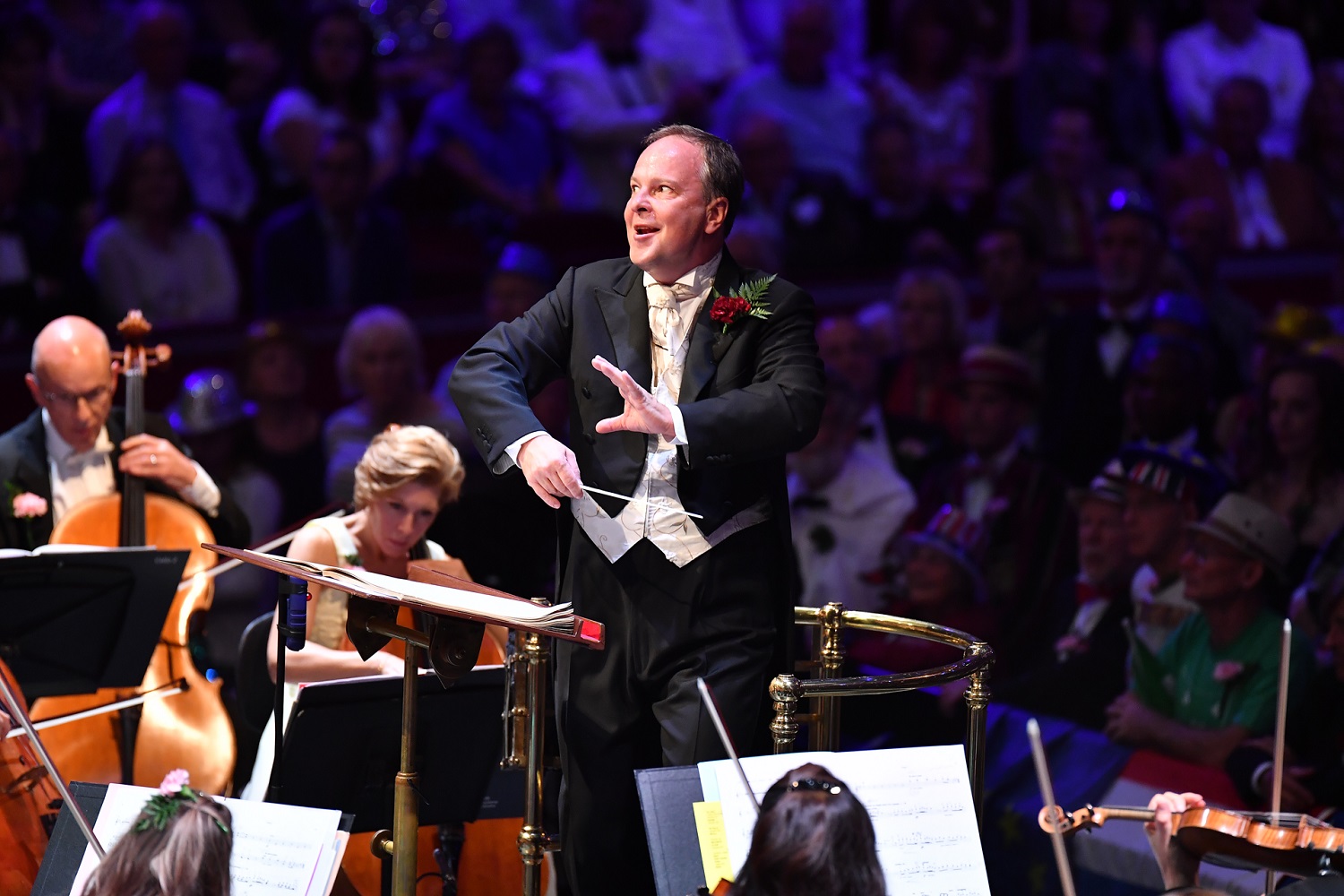Last Night of the Proms, Barton, BBCSO, Oramo review – woke not broke | reviews, news & interviews
Last Night of the Proms, Barton, BBCSO, Oramo review – woke not broke
Last Night of the Proms, Barton, BBCSO, Oramo review – woke not broke
Traditional revelries, but with a strong focus on diversity and inclusion
The BBC put social and ethnic diversity at the heart of this Last Night programme. The concert opened with a new work, by Daniel Kidane, called Woke, and the first half was dominated by the music of black and female composers.
Woke is a dynamic concert opener, energised by driving percussion rhythms. The large orchestra is skilfully deployed for diverse colours while always retaining a clarity of texture. The music eventually settles into lush, sonorous harmonies, but it meanders when the initial impetus is lost: that percussive opening proves its greatest strength.
The Second Suite from Falla’s The Three-Cornered Hat could easily have been cut. It is not lacking for performances, and was rendered superfluous by the Carmen "Habanera" later on. It was given an elegant reading, though, by the BBC Symphony Orchestra under Sakari Oramo, the players demonstrating all the versatility and grace under pressure required of such an evening. Laura Mvula’s Sing to the Moon was arranged here for unaccompanied chorus, and performed by the BBC Singers. They, too, demonstrated remarkable versatility, though the soul number sat uneasily as a part-song.
Elizabeth Maconchy’s Proud Thames is an evocative tone poem that has been waiting almost 70 years for a Proms performance. It is a beautiful evocation of the river – shades of Smetana, if on a smaller scale. But it was upstaged by Elgar, whose Sospiri followed, a work similar in spirit but far superior. It was given another stylish performance by the BBC Symphony, although a low register on the organ pedal board occasionally threatened to overwhelm the ensemble.
Jamie Barton ended the first half with a whistle-stop tour of famous mezzo arias, from Carmen, Samson and Delilah and Don Carlos. She put more effort into stylisation than projection, and in the Carmen Habanera the eager orchestra sometimes masked her (the balance was probably better on the TV). In Delilah’s aria, “Ma Coeur s’ouvre à ta voix”, Barton’s expression was more disciplined, her slides less emphatic. “O don fatale” from Verdi’s Don Carlos worked best, Barton’s tone here taking on a darker hue, and her emphatic articulation structuring the Italian text. 
Barton sang two show numbers for her second appearance, "Over the Rainbow" and "I Got Rhythm". Subtle amplification allowed her more flexibility of tone, the direct simplicity of the first song contrasting the sass and rhythmic bite of the second. Then on to the usual festivities. The Fantasia on British Sea-Songs was supplemented with choral arrangements of songs from Scotland, Wales and Ireland, the most successful a surprisingly tasteful "Danny Boy" arranged by Bob Chilcott. Oramo’s speech was a brief salute to the virtues of music education and of live performances. The crowd went wild for Land of Hope and Glory but stood in dignified silence for Britten’s exquisite choral setting of the national anthem. Then Auld Lang Syne, and the last train home.
The future of Arts Journalism
You can stop theartsdesk.com closing!
We urgently need financing to survive. Our fundraising drive has thus far raised £33,000 but we need to reach £100,000 or we will be forced to close. Please contribute here: https://gofund.me/c3f6033d
And if you can forward this information to anyone who might assist, we’d be grateful.

Subscribe to theartsdesk.com
Thank you for continuing to read our work on theartsdesk.com. For unlimited access to every article in its entirety, including our archive of more than 15,000 pieces, we're asking for £5 per month or £40 per year. We feel it's a very good deal, and hope you do too.
To take a subscription now simply click here.
And if you're looking for that extra gift for a friend or family member, why not treat them to a theartsdesk.com gift subscription?
more Classical music
 RAM Song Circle, Wigmore Hall review - excellent young musicians lift the spirits
Royal Academy singers revel in merry monks, mourning mothers and morose musings
RAM Song Circle, Wigmore Hall review - excellent young musicians lift the spirits
Royal Academy singers revel in merry monks, mourning mothers and morose musings
 Gigashvili, Hallé, Cox, Bridgewater Hall, Manchester review - beauty and style from a winning pianist
Music and ‘noise’ come together as new music meets Mozart and Tchaikovsky
Gigashvili, Hallé, Cox, Bridgewater Hall, Manchester review - beauty and style from a winning pianist
Music and ‘noise’ come together as new music meets Mozart and Tchaikovsky
 Giltburg, Pavel Haas Quartet, Wigmore Hall review - into the labyrinth of a Martinů masterpiece
Fierce Czech first half followed by more storm but also balm in Brahms
Giltburg, Pavel Haas Quartet, Wigmore Hall review - into the labyrinth of a Martinů masterpiece
Fierce Czech first half followed by more storm but also balm in Brahms
 Tiffin Youth Choir, London Philharmonic Orchestra and Chorus, Jurowski, RFH review - perfect detachment suits public statements
Poised Haydn and John Adams in a surprising sequence
Tiffin Youth Choir, London Philharmonic Orchestra and Chorus, Jurowski, RFH review - perfect detachment suits public statements
Poised Haydn and John Adams in a surprising sequence
 Celtic Connections: Orchestral Qawwali Project, GRIT Orchestra review - two concerts showcasing the cross-genre power of an orchestra
Orchestral music imagined in many ways in Glasgow's global music festival
Celtic Connections: Orchestral Qawwali Project, GRIT Orchestra review - two concerts showcasing the cross-genre power of an orchestra
Orchestral music imagined in many ways in Glasgow's global music festival
 Sun Rings, Sacconi Quartet, Festival Voices, Kings Place review - lift-off for an exhilarating voyage into the unknown
A suitably radiant interpretation of a Terry Riley epic
Sun Rings, Sacconi Quartet, Festival Voices, Kings Place review - lift-off for an exhilarating voyage into the unknown
A suitably radiant interpretation of a Terry Riley epic
 German National Orchestra, Marshall, Cadogan Hall review - sheer youthful exuberance
Teenagers on tour bring effusive music-making
German National Orchestra, Marshall, Cadogan Hall review - sheer youthful exuberance
Teenagers on tour bring effusive music-making
 Leif Ove Andsnes, Wigmore Hall review - colour and courage, from Hardanger to Majorca
Bold and bracing pianism in favourite Chopin and a buried Norwegian treasure
Leif Ove Andsnes, Wigmore Hall review - colour and courage, from Hardanger to Majorca
Bold and bracing pianism in favourite Chopin and a buried Norwegian treasure
 Chamayou, BBC Philharmonic, Wigglesworth, Bridgewater Hall, Manchester review - Boulez with bonbons
Assurance and sympathy from Mark Wigglesworth for differing French idioms
Chamayou, BBC Philharmonic, Wigglesworth, Bridgewater Hall, Manchester review - Boulez with bonbons
Assurance and sympathy from Mark Wigglesworth for differing French idioms
 Classical CDs: Antiphons, ale dances and elves
Big box sets, neglected symphonies and Norwegian songs
Classical CDs: Antiphons, ale dances and elves
Big box sets, neglected symphonies and Norwegian songs


Add comment